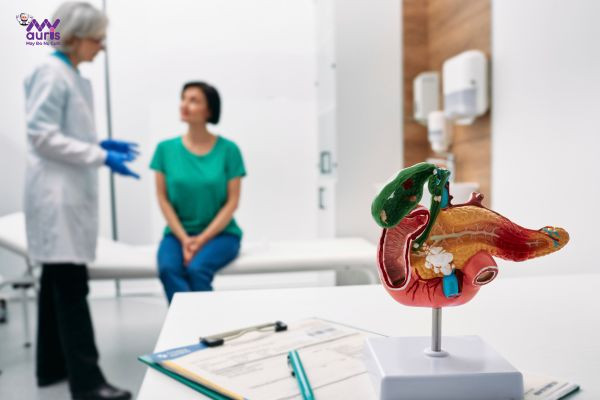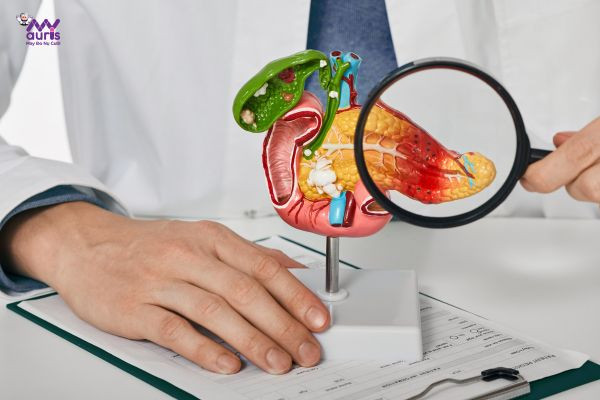The pancreas, although small in size, is an important organ of the digestive system, playing a role in producing enzymes that support digestion and hormones that regulate blood sugar. Pancreatitis is a common disease today, causing many effects on the patient’s health. So can pancreatitis be cured? Let’s find out more details withMy Auris through the following article.
Can pancreatitis be cured?
The pancreas is an organ in the digestive system that performs two main functions:
- Creates enzymes that supply the small intestine to support the digestion of proteins and starches.
- Produces the hormones insulin and glucagon to control blood sugar levels.
Pancreatitis is a condition in which the gland becomes inflamed and red due to digestive fluids or enzymes attacking the pancreas. However, depending on the type of pancreatitis, pancreatitis can be cured or there are different treatments. Accordingly, pancreatitis is divided into two types: acute pancreatitis and chronic pancreatitis.
- Acute pancreatitis: The condition progresses rapidly over a short period of time, with sudden and intense symptoms. In some cases of mild acute pancreatitis, the disease can go away on its own without treatment. In some severe cases, if not treated promptly, symptoms become more severe, greatly affecting health and even leading to death.
- Chronic pancreatitis: Long-term, untreated pancreatitis will affect the structure and function of the pancreas, over time it will become chronic pancreatitis. Without timely intervention, disease symptoms will affect health and life.

So, can pancreatitis be cured, doctors say, if aggressive treatment, the patient can completely recover. can cure diseases and prevent dangerous complications that are harmful to health.
Symptoms of pancreatitis
Most of the symptoms in the stages of the disease are similar, so it makes the patient subjective. Therefore, to detect pancreatitis early, you need to clearly understand the symptoms of acute pancreatitis and chronic pancreatitis. If you feel abnormal in your body and xIf you experience the following symptoms, you should go to the hospital for a health check as soon as possible.
Symptoms of acute pancreatitis
- Upper abdominal pain or pain radiating to the back
- Fever
- Nausea, vomiting
- Tachycardia
- Abdominal bloating, loss of appetite
Symptoms of chronic pancreatitis >
- Pain in the upper abdomen often occurs after eating, the pain spreads to the back
- Diarrhea
- Nausea, vomiting
- Unexplained weight loss
- Fat stool

Is pancreatitis dangerous?
Assessing the severity of the disease depends on many factors, of which acute pancreatitis can progress quickly and cause many dangerous complications. If the patient is not treated and actively monitored, it can lead to death due to serious complications such as:
- Kidney failure: the function and structure of the kidneys are weakened and cannot filter out excess waste from the body. At this time, the patient can be eligible for dialysis.
- Shock: Acute pancreatitis can cause septic shock or hemorrhagic shock, both of which are dangerous to the patient’s health. This complication can occur in the first days of the disease or after a few weeks from the appearance of signs of inflammation.
- Hemorrhage: Complications of vascular damage often occur quite early in the first week of acute pancreatitis onset. Most cases with bleeding have a severe prognosis.
- Acute respiratory failure: chemical changesproduced in the body can affect gas exchange in the lungs, causing hypoxia. From there, it causes difficulty breathing leading to acute respiratory failure.
- Pancreatic infection: This complication usually occurs at the beginning of the second week or at the end of the first week after the onset of acute pancreatitis. Patients need careful monitoring and care to avoid the formation of an abscess in the pancreas. Because the formation of an abscess can cause extremely dangerous tissue necrosis.
- Pancreatic pseudocyst: Acute pancreatitis can severely damage the pancreatic parenchyma, forming a pseudocyst. If these cysts drain or clear up on their own, there will be no health problems. On the contrary, the cysts progress to abscesses and cause superinfection.
- Malnutrition: when the pancreas has problems, less enzymes are produced, affecting the absorption and digestion of food, leading to malnutrition, diarrhea and weight loss.

In general, acute pancreatitis is more dangerous to health and life if not treated timely treatment. Chronic pancreatitis rarely causes dangerous complications. However, if subjective, chronic pancreatitis can cause complications such as malnutrition, pancreatic cancer, infection, kidney damage, diabetes, etc. style=”font-weight: 400;”>Treatment of pancreatitis will be divided into 2 phases, first is treatment to control the disease condition and symptoms, then treatment is the root cause. Specifically as follows:
Treatment to control the disease
Symptoms and complications of pancreatitis progress rapidly, so treatment to control and prevent symptoms from developing is very necessary. First, the treatment method is aimed at restoring kidney function, ensuring normal activities in the body.
At that time, the patient needs to provide nutrition directly through an intravenous tube to reduce the activity of the pancreas in digesting food.
Normally, disease control treatment lasts a few days or weeks depending on the level of response to treatment. When the condition is relatively controlled, the doctor instructs you to eat liquid and bland foods and then gradually eat normally.
Depending on the symptoms and complications of the disease, the doctor will consider a treatment plan, in which the treatment principle is to avoid water and electrolyte imbalance and controlControl persistent abdominal pain.
Complete treatment
After the control treatment phase, the pancreatitis condition improves well, the doctor will perform phase 2 of treatment, which is radical treatment. Treatments include:
- Pancreatic surgery
- Gallbladder surgery
- Biliary tract stone removal intervention

After thorough treatment, patients should not be subjective because the disease can easily relapse. Therefore, in daily activities and eating, you need to pay attention to:
- Quit alcohol, beer, and stimulants
- Fully supplement nutrients, but limit fat absorption
- Tobacco
- Eat bland food, less spices, prioritize vegetables and fruits
- Enzyme supplementation to support digestion while pancreatic function has not fully recovered.
- Exercise every day for at least 30 minutes.
- Regular health check-ups, especially for people with blood fat, diabetes,…
Above is the information aboutcan pancreatitis be cured, hopefully everyone will have more useful knowledge and solve their worries. To quickly improve the disease, early treatment intervention is very important, along with changing a healthy diet and lifestyle.
Anh Thy





